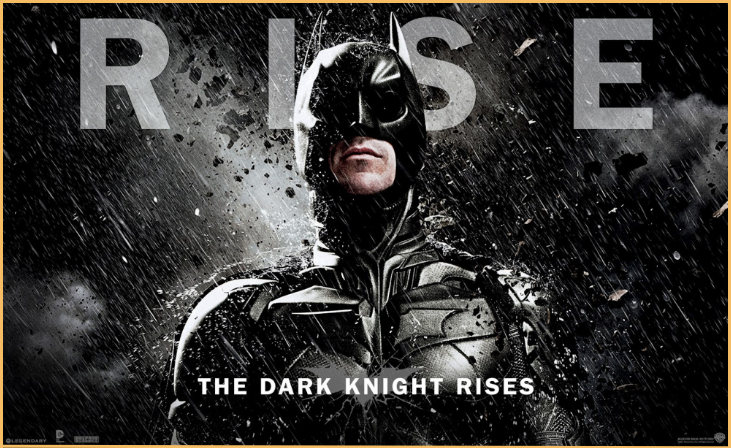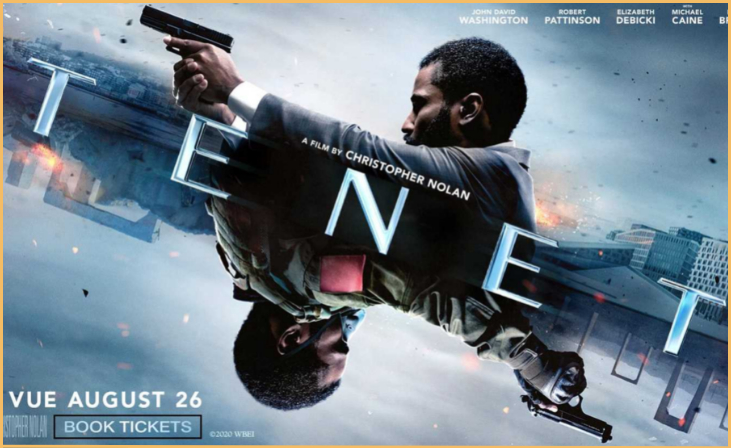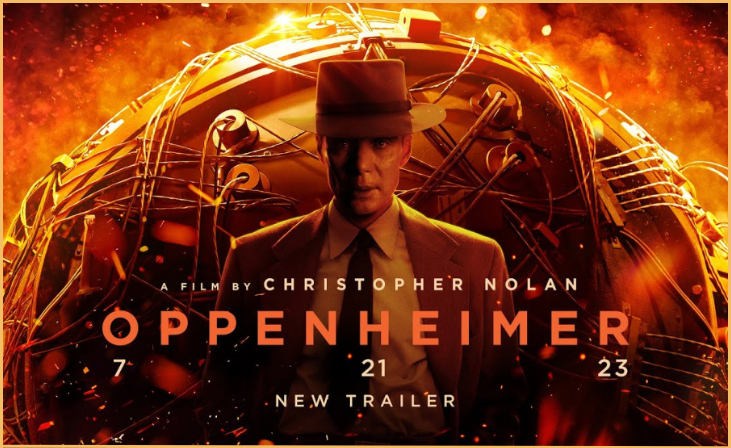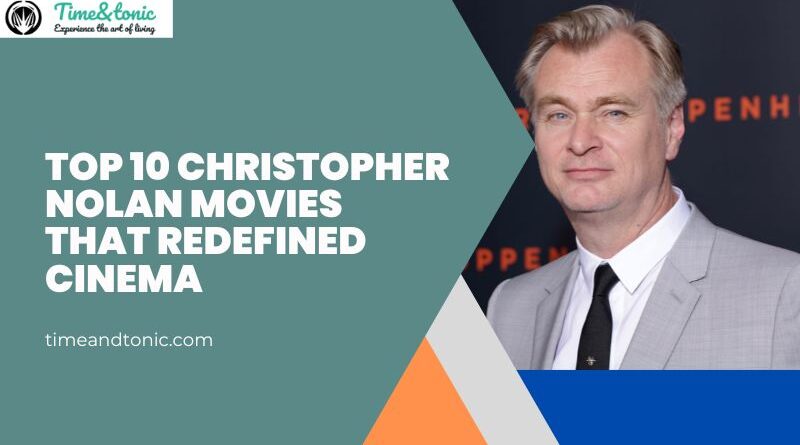Top 10 Christopher Nolan Movies That Redefined Cinema
Christopher Nolan stands as one of Hollywood’s most iconic directors, renowned for his audacious storytelling and an unmistakably unique filmography that spans genres from science fiction to gripping action. His fascination with the world of cinema ignited at the tender age of 7 when he began crafting his own short films using his father’s Super 8 camera.
Throughout his life, Nolan has remained devoted to the art of creating intricate cinematic universes, leaving audiences perpetually intrigued. His commitment to his craft is evident in the remarkable frequency with which he releases his films, typically within a span of just two to three years. However, it is Nolan’s signature trait that truly distinguishes him—a penchant for intricate, intellectually stimulating narratives infused with scientific concepts, all skillfully woven together in a manner that demands close attention from viewers to fully grasp.
In this article, we will delve into the top 10 Christopher Nolan movies that have redefined the art of filmmaking.
Best Christopher Nolan Movies
This list provides a comprehensive overview of every film directed by Christopher Nolan. As we delve deeper into the creative process and the cinematic allure of Nolan’s works…
1. The Dark Knight Rises (2012)

Right from the beginning, “The Dark Knight Rises” faced two monumental challenges. First, the absence of the iconic Joker character, and second, the lingering legacy of the Joker. Attempting to recreate the societal impact that Heath Ledger’s portrayal of the Joker had achieved was not only a Herculean task but also one that seemed destined for failure.
In order for the film to achieve a semblance of success in its conclusion, pitting Batman and Catwoman (played by Anne Hathaway) against formidable foes like Bane (Tom Hardy) and a surprise villain was akin to an extraordinary feat. While it couldn’t hope to replicate the profound impact “The Dark Knight” had on its audience and, like “Batman Begins,” has somewhat faded into the shadow of its predecessor, the film’s exploration of Batman’s aging, self-imposed exile, and enduring legacy still delivered a compelling superhero narrative.
2. Inception (2010)
Nolan’s second-most culturally impactful film, “Inception,” made an enormous impact upon its release in 2010. The story follows Cobb (played by Leonardo DiCaprio), an adept information thief who utilizes a military experiment to infiltrate the dreams of his targets, extracting valuable secrets for a fee. However, his life takes a dramatic turn when he is presented with the seemingly impossible task of “inception,” which involves implanting an idea into someone’s subconscious mind through their dreams—such as the notion of dismantling one’s father’s business empire.
While “Inception” garners considerable praise for its ability to translate complex concepts into understandable and engaging narrative elements, it doesn’t entirely escape criticism for its assortment of plot holes. Nevertheless, for those willing to look past these flaws, the film offers a treasure trove of original and inventive action sequences, a profound exploration of themes related to loss and grief, and a remarkable musical score that stands among the best of the 2010s, rivaling the work of Trent Reznor and Atticus Ross on David Fincher’s films. “Inception” enjoyed significant critical acclaim, earning eight Academy Award nominations and securing four wins.
3. Memento (2000)
Essentially serving as a precursor to “Tenet,” “Memento” revolves around a man portrayed by Guy Pearce who is on a quest to uncover the identity of his wife’s killer. However, there’s a significant obstacle—he suffers from short-term memory loss, rendering him incapable of forming new memories. Consequently, the audience experiences his perspective in a fragmented manner, with one narrative thread starting at the beginning and progressing forward, another beginning at the end and moving backward, and the film ultimately culminating in these timelines converging at the midpoint. “Memento” is a cinematic anomaly, unlike any other, catapulting Christopher Nolan into the forefront of puzzle-based filmmaking and establishing a precedent for his films that often demand repeated viewings to fully grasp their intricacies.
Quick Link: What Is Your Birthstone As Per Your Birth Month?
4. Interstellar (2014)
While some aspects of its ending may stir controversy among viewers, “Interstellar” undeniably stands out as a remarkable entry in Christopher Nolan’s filmography. Set in the not-so-distant future, as Earth faces imminent demise, the film follows a former pilot turned farmer who must take to the skies once again as part of a NASA mission. Their objective: is to explore three potentially habitable worlds in distant solar systems.
The film’s musical score, composed by Hans Zimmer, reaches the pinnacle of his craft, Matthew McConaughey delivers a performance that some argue surpasses even his Oscar-winning role in “Dallas Buyers Club,” the visual effects push the boundaries of cinematic artistry, as far as inspiring two scientific papers about the insights gained from the painstaking 100-hour-per-frame rendering process, particularly in depicting the interiors of black holes. “Interstellar” weaves a narrative that simultaneously devastates and uplifts viewers, touching their emotions in ways unlike any other film in Nolan’s repertoire.
5. Tenet (2020)

“Tenet” has received mixed reviews from audiences, but its legacy is marked by the unique circumstances of its release during the COVID-19 pandemic, which sparked controversy and debates. In reality, “Tenet” is a complex and intricate amalgamation of time travel and entropy, offering a challenging journey through the creative mind of Christopher Nolan. Over time, it may come to be recognized as a notable addition to his filmography.
However, in today’s popular culture, the film’s release strategy, with Warner Bros. pushing for a theatrical release even before the pandemic was fully under control, has overshadowed its artistic merits. The controversy surrounding this decision has become the defining commercial aspect of a film that many have yet to experience. Therefore, the judgment of “Tenet” must consider not only its cinematic qualities but also its limited cultural impact. While it received critical acclaim and earned two Academy Award nominations, it ultimately won in the category of Best Visual Effects.
6. Batman Begins (2005)
The Nolanverse kicks off with all the classic elements of a Bruce Wayne origin story: wealthy parents, a tragic loss, and the transformation into the Dark Knight. Similar to Nolan’s other Batman films, “Batman Begins” introduces two formidable villains, Scarecrow (Cillian Murphy) and Ra’s al Ghul (Liam Neeson), both posing significant challenges to Wayne (Christian Bale) in his quest to protect Gotham.
“Batman Begins” holds a significant place in 21st-century cinema, as it not only catapulted Christopher Nolan into the ranks of A-list directors but also served as a blueprint for contemporary blockbusters. Its influence can still be seen today, with movies attempting to emulate its emphasis on realism and grounded storytelling. Additionally, the film popularized the concept of the reboot, redefining Batman for a new generation and setting the stage for a highly successful trilogy. In many ways, it encouraged audiences to reconsider the possibilities of a summer blockbuster.
7. Dunkirk (2017)
Nominated alongside “Darkest Hour” for the title of Best 2017 Movie About Britain’s War Strategy at Dunkirk, “Dunkirk” held a crucial advantage – it was an exceptional movie. Initially underestimated as one of Nolan’s less inventive concepts, “Dunkirk” pays tribute to the courageous individuals who fought to secure Britain’s prospects during World War II. While it may lack the intricate time-travel elements or totems that Nolan fans often expect, it more than compensates with its gripping intensity and exceptional quality.
8. The Dark Knight (2008)
represents the ultimate altruistic hero or if he could have more effectively combated crime by investing in his community rather than resorting to physical violence against criminals and maintaining a complicated relationship with Catwoman. While “The Dark Knight” has been celebrated for over a decade, largely due to Heath Ledger’s portrayal of the Joker, what truly makes the Joker an incredible villain is not just his twisted philosophy, unpredictable nature, and Ledger’s exceptional performance but the fact that he embodies the antithesis of Batman.
Nolan’s Batman is forced to confront the realization that the perpetual cycle of masked criminals would only cease if he did, and to fulfill his responsibility, he had to let go of his ego-driven persona. It becomes impossible to argue that Batman was truly benevolent in his actions while Wayne hoarded wealth, or that his authoritarian desire for control over Gotham, both as the billionaire Wayne and the vigilante Batman, doesn’t border on autocracy.
Ultimately, “The Dark Knight” stands out as Nolan’s greatest film and arguably one of the finest superhero films ever made because it suggests that humanity, as a collective, is inherently good, as evidenced by the citizens and prisoners on the ferries choosing sacrifice over harming each other. However, it also highlights that individual heroes can be corrupted by power and idolatry. Therefore, Batman’s greatest adversary is, paradoxically, Batman himself.
9. The Prestige (2006)
In Nolan’s films, there is often a remarkable twist at the end, but “The Prestige” takes it to another level with several twists throughout the story. Set in the 1890s, the film revolves around two rival magicians, portrayed by Christian Bale and Hugh Jackman, who are locked in a fierce competition for the title of London’s greatest magician. Their obsession with outdoing each other drives them to extreme measures, including self-sabotage, damaging their relationships, and even risking their own lives for the sake of a mind-bending illusion.
As the rivalry intensifies, they become obsessed with performing the ultimate magic trick, teleporting from one end of the stage to the other in the blink of an eye. However, they soon discover that achieving real magic comes at a profound cost – a blood sacrifice. Despite not receiving as much popular recognition as some of Nolan’s other works, “The Prestige” stands out as one of his absolute best creations. It features exceptional performances, a series of brilliant surprises, and leaves audiences pondering profound philosophical questions.
Find More: 7 Motivational Quotes About Women’s Empowerment
10. Oppenheimer (2023)

Christopher Nolan’s most recent cinematic endeavor, “Oppenheimer,” takes audiences on a compelling journey through the life of the eponymous J. Robert Oppenheimer, renowned for his pivotal role in the creation of the atomic bomb and the subsequent reckoning with his legacy as the “destroyer of worlds.” This ambitious biopic unfolds across three distinct time periods, employing a non-linear narrative structure that navigates the bomb’s development, Oppenheimer’s security hearing in 1954, and Lewis Strauss’ confirmation hearing in 1959. Clocking in at a precise three-hour runtime, “Oppenheimer” stands as Nolan’s longest and, perhaps, most audacious cinematic undertaking to date.
What has catapulted “Oppenheimer” into the cultural zeitgeist, apart from its coincidental release alongside Barbie, is its masterful craftsmanship, captivating audiences worldwide. Nolan skillfully transforms the well-documented life of a historical figure into a thrilling and, at times, terrifying cinematic experience. “Oppenheimer” transcends the confines of a traditional biopic by immersing viewers in a narrative that often resembles a horror film. The exploration of the specter of nuclear holocaust, as witnessed through the eyes of the man responsible for humanity’s newfound power to obliterate itself, yields a study that is both intellectually stimulating and emotionally harrowing.
Bolstered by an ensemble cast of stellar performers, “Oppenheimer” extracts career-defining portrayals from each of them. Cillian Murphy, a frequent collaborator in Nolan’s films, takes center stage with a performance that encapsulates the unwavering determination and profound guilt of a man who ignited the fuse of global destruction. Robert Downey Jr. delivers a standout portrayal of Lewis Strauss, revealing the complexities of a character-driven by political ambition.
Enhanced by breathtaking visuals and a chilling score composed by Ludwig Göransson, “Oppenheimer” is a thought-provoking cinematic work that lingers in the minds of its viewers. It represents Nolan at the peak of his directorial prowess, and while its runtime may test patience slightly, the film is a visual spectacle best enjoyed on the grandest of screens. Unflinching in its portrayal of the somber and distressing facets of war, “Oppenheimer” is replete with scenes that will leave an indelible mark on its audience for years to come.
Final Words
In the realm of modern cinema, Christopher Nolan stands as a true visionary who has redefined the art of filmmaking. His movies consistently challenge conventional storytelling, push the boundaries of visual effects, and provoke thought on profound themes. From the mind-bending narratives of “Inception” to the dark and gripping world of “The Dark Knight,” Nolan has left an indelible mark on the industry.
His dedication to storytelling, meticulous attention to detail, and penchant for exploring complex concepts have earned him a devoted following of cinephiles worldwide. While opinions on his films may vary, there’s no denying that Christopher Nolan’s contributions have reshaped the cinematic landscape.
As we eagerly await his next cinematic masterpiece, we can reflect on the incredible journey he has taken us on so far. Christopher Nolan’s movies have not only entertained us but also challenged us to think differently about the possibilities of cinema.
FAQs
Christopher Nolan distinguishes himself with his intricate storytelling, non-linear narratives, and ability to blend intellectual concepts with blockbuster entertainment. His dedication to practical effects and commitment to pushing the boundaries of visual storytelling have made him a true auteur in the industry.
Nolan is known for his non-linear storytelling, intricate plots, and themes that often delve into the complexities of time and memory. He frequently employs practical effects and in-camera techniques to create visually stunning sequences, prioritizing realism in a digital age.
“The Dark Knight” is often regarded as Christopher Nolan’s magnum opus, not only for its critical and commercial success but also for its profound impact on the superhero genre. Heath Ledger’s portrayal of the Joker in the film is widely celebrated as one of the greatest performances in cinema history.




